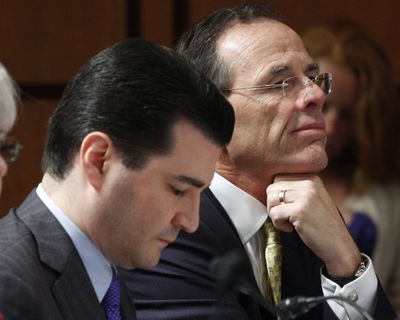Trump to select Scott Gottlieb, a physician with deep drug-industry ties, to run the FDA

President Trump is expected to pick Scott Gottlieb, a conservative physician and businessman with deep ties to the pharmaceutical industry, to be commissioner of the Food and Drug Administration, a source familiar with the nomination said Friday.
If confirmed, Gottlieb would bring a strong pro-industry, deregulatory approach to an agency that Trump has criticized as being overly restrictive. But he is also viewed as someone who would preserve the agency’s basic function: to ensure that drugs are proven to be safe and effective before they are allowed to be sold.
His selection would be a victory for the mainstream pharmaceutical industry, which has little appetite for upending the FDA approval process. Even Democratic critics of the industry, and of Gottlieb himself, privately indicated they preferred him to another frequently mentioned contender, Jim O’Neill, an associate of Silicon Valley billionaire and Trump adviser Peter Thiel. In a 2014 speech, O’Neill called for allowing drugs to be marketed after they had been proven safe, but before they had been shown to be effective.
O’Neill’s views and Trump’s recent comments that the FDA’s approval process is “slow and burdensome” – despite data showing that reviews have accelerated – caused alarm in some quarters that the agency faced the kind of tectonic changes now affecting the Environmental Protection Agency.
But while Gottlieb, 44, is not seen as someone interested in dismantling the FDA, he is still likely to try shaking it up in significant ways. A former deputy FDA commissioner during the George W. Bush administration, he often has faulted the agency in speeches and opinion columns, saying that its excessive rules have stifled competition, especially because of how generic versions of complex medicines are reviewed. He also has castigated government efforts to go after companies for “off-label promotion,” which is when manufacturers tout drugs for purposes for which they haven’t been approved.
Gottlieb’s industry ties would be closely scrutinized. A partner at the venture capital firm New Enterprise Associates, he has served as a consultant or adviser to many pharmaceutical and biotech companies, as well as information technology firms that provide software for clinical trials.
He is managing director of T.R. Winston & Co., a privately held merchant bank based in Los Angeles that focuses on health care, energy and consumer technology. And he is a member of the product investment board of GlaxoSmithKline, one of the world’s largest pharmaceutical companies.
According to a federal database, Gottlieb received more than $413,000 in consulting and speaking fees and other payments from pharmaceutical companies between 2013 and 2015.
Michael Carome, director of Public Citizen’s Health Research Group, described Gottlieb as “entangled in a web of Big Pharma ties” and said his confirmation “would accelerate a decades-long trend in which agency leadership too often makes decisions that are aligned more with the interests of industry than those of patients.”
But Gottlieb also has taken occasional shots at the industry, at least on the issue of high prices. In a Forbes column last year, he didn’t mince words about the complicated and secretive system of list prices and rebates that shape drug costs prices and have led to political and public anger as well as confusion.
“As much as the drug makers complain about the rebating scheme, they’ve grown as dependent on its subterfuge, opacity and inequity as everyone else in the system,” Gottlieb wrote.
John Rother, president of the National Coalition on Health Care and the leader of a group that campaigns against high drug prices, said Gottlieb is “smart and knows the FDA and the issues.”
Gottlieb, a senior fellow at the American Enterprise Institute, is a frequent contributor to the opinion columns of the Wall Street Journal as well as Forbes. Those writings and his speaking appearances shed light on what he might focus on as commissioner.
His criticism of FDA restrictions on what manufacturers are permitted to say about off-label uses of their products goes back years. In 2008, Gottlieb wrote that FDA was pursuing a “rigid standard” and that “doctors should be trusted to properly weigh” various sources of information about drugs.
Since then, FDA has eased and clarified some of its positions on off-label use, but it still asserts that overly permissive policies could result in unproven therapies being pushed to doctors, with potentially dangerous consequences for patients. In recent years, the agency has lost some high-profile lawsuits on the issue on First Amendment grounds.
Gottlieb, who is a lymphoma survivor, also has complained that some parts of the agency are too slow in approving new products or new uses for existing drugs. He has praised FDA’s oncology division, which has sped up approvals under the leadership of Richard Pazdur.
Ellen Sigal, chairman of Friends of Cancer Research, an advocacy group, said she supported Gottlieb for commissioner. “Throughout his career, Scott has shown a deep understanding of patients needs, and as a cancer survivor himself, he will keep them as his north star,” she said.
In a 2007 op-ed in the Wall Street Journal , he decried a mentality of pharma-bashing in policymaking. In a 2011 piece , he took issue with the agency’s oversight of medical devices, citing an aortic heart valve that had been approved in Europe years earlier.
Last year, he returned to that aortic valve – criticizing Medicare for limiting access to it. “This episode is a vivid example of the government’s increasing practice to regulate medicine and ration care,” he wrote.